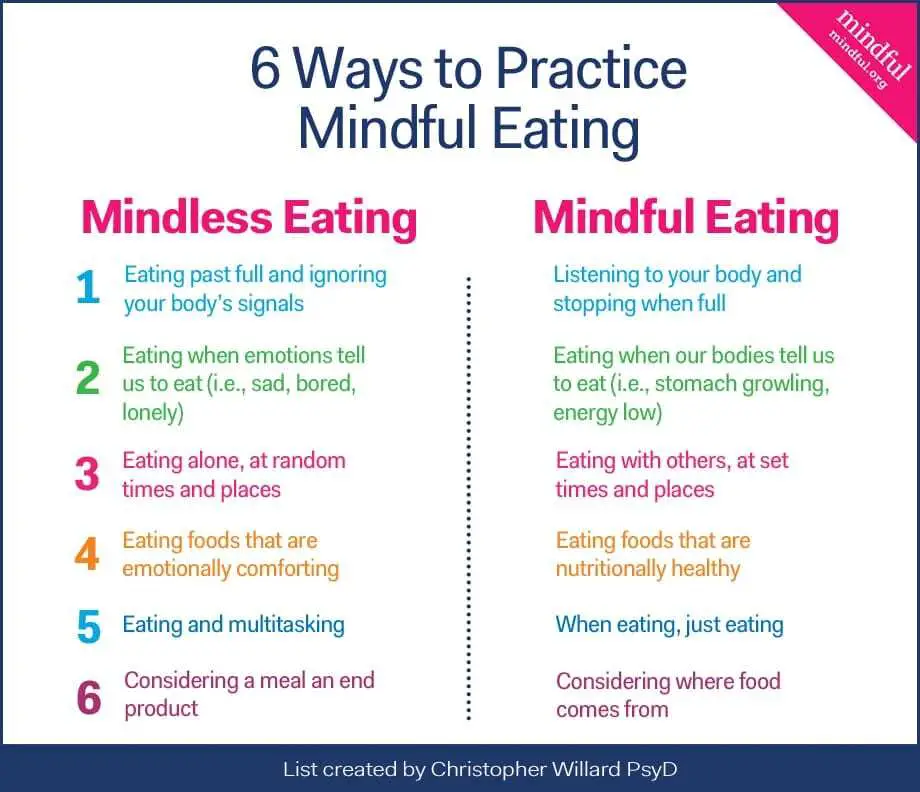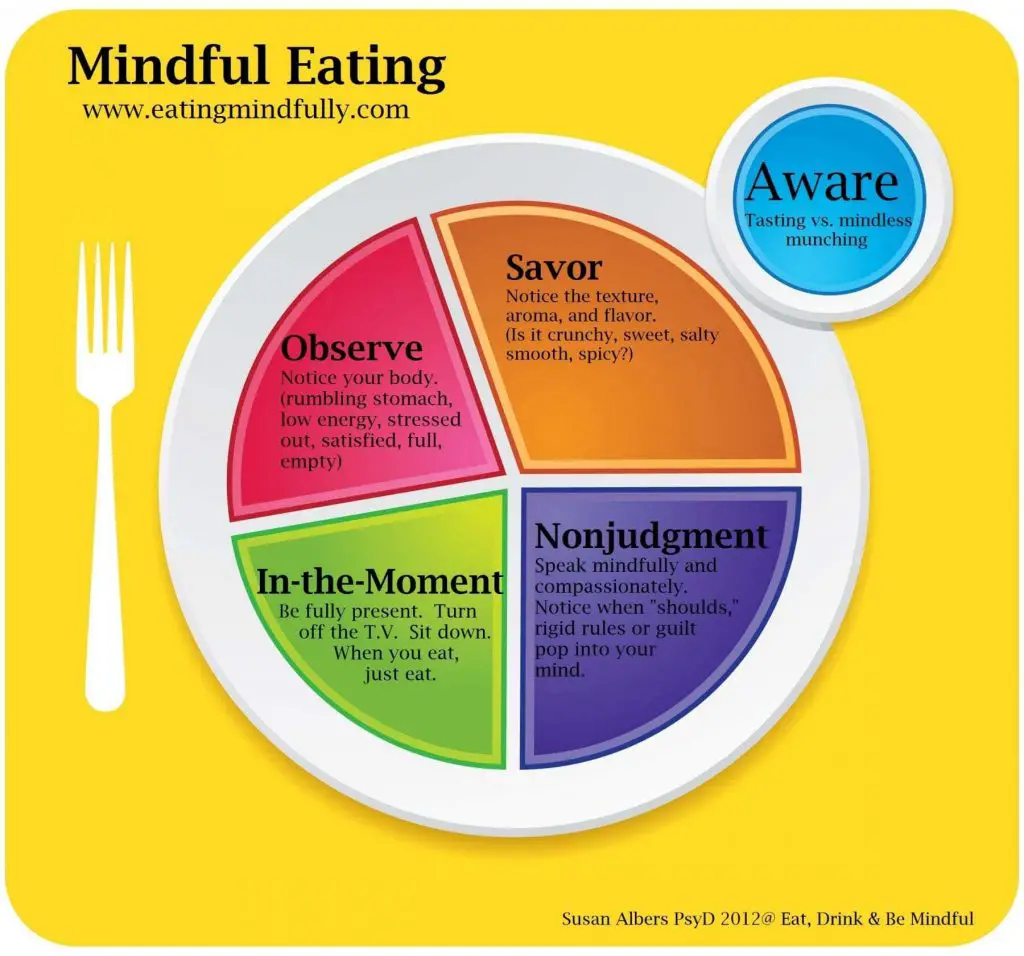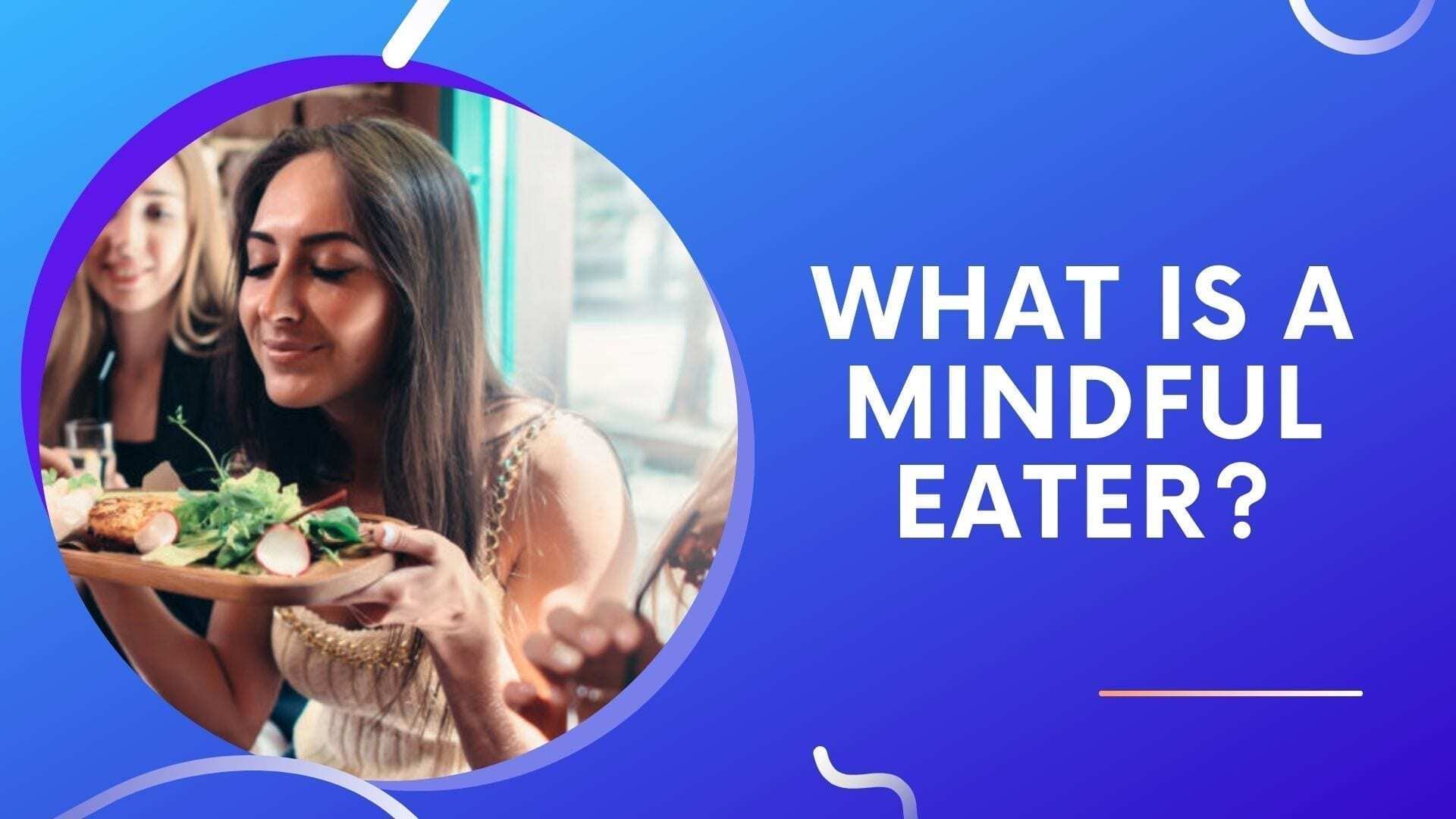Mindful eating on its surface is very simple, but in practice, mindful eating and becoming a mindful eater is more difficult.
I first learned about eating with mindfulness when I lived as a Zen Monk for 13 months.
During this time I fundamentally changed my eating habits because I became much more aware of how I was eating.
See, I used to struggle with overeating, and the mindfulness concepts and community rituals I learned as a monk really helped me to heal my relationship with food.
On a superficial layer, being a mindful eater just means you just pay attention to how you eat, how the food tastes, and how you feel before and after.
That sounds easy enough, right? Wouldn’t you too like to change your eating habits with a little dash of awareness?
But of course mindful eating is not so easy. Many of us have tried mindful eating before but wouldn’t consider ourselves a mindful eater.
A good many other people are also lacking some fundamental insights into what mindfulness really is, or what being a mindful eater really means.
Plus, how does one go about practicing mindfulness and eating to become a mindful eater?
We’ll explore these questions and more down below.
And yes! I know what you are thinking.
“But I don’t have time to become a mindful eater.”
But rest assured, you can become a mindful eater and reap the benefits without spending crazy amounts of time eating in Zen silence.
What Is A Mindful Eater?
On the most simple level, mindful eating is where you put down your phone and taste your food.
Instead of being distracted while you eat and mindlessly eating, you stay gently focused and “present” on how the food tastes in your mouth.
But what most people don’t realize is that mindful eating goes beyond being present with your food.
Being a mindful eater includes being aware of the entire spectrum of eating experiences, including before, during and after eating.
Here are some key elements of mindful eating that encompass the whole Mindful Eating spectrum:
- Learning to distinguish whether you are physically hungry or emotionally hungry
- Listening to fullness cues so you can stop before you get too full
- Eating with full presence and noticing sights, sounds, textures, and smells of your meal
- Learning to not judge yourself if you binge or make an eating ‘mistake’ but instead to practice non-judgment
- Noticing how foods impact your body, in particularly noticing how processed foods lead to lethargy while more wholesome foods lead to energy
- Savoring, slowing down and chewing your food
- Changing your relationship with food from distraction to being in the present moment
This graphic down below shows some key elements of Mindful Eating.

Here’s a graphic which can help you to understand what this whole eating with awareness thing is all about:
Now admittedly you may have heard some of these things before, like avoiding eating while multitasking.
But did you know that eating with mindfulness also includes these two aspects as well:
- Considering where food comes from
- Eating with other people
I know that ‘thinking about where your food comes from’ sounds like the opposite of mindfulness. After all, doesn’t the whole practice of being mindful mean you don’t have thoughts?
But no – mindful eating includes thinking about where your food comes from so you can really appreciate the journey the food has gone on, from farm to your mouth.
And you’ll see down below, when we talk about how to practice mindfulness while eating, that mindful eating is not done only when you eat.
Instead the correct mindset is to think of mindful eating as including the moments:
- Before you eat
- During you eat
- After you eat

This is the true meaning of mindful eating!
However, let’s start with the basics. The basics of mindful eating are slowing down and bringing a gentle focus to your food.
Now, if you are unfamiliar with eating mindfully, it might sound ineffective to slow down and focus. Why would someone want to slow down, think about, and taste their food?
What Is The Purpose Of Mindful Eating?
The benefits of mindful eating might not be readily apparent.
What does eating mindfully have to do with health, weight loss, or binge eating?
Someone might say “Sure, slowing down to taste your food better is nice, but does slowing down really benefit your health?”
It turns out that yes, slowing down does benefit your health, but there’s more to the benefits of mindful eating besides eating slowly.
The benefits of mindful eating pretty much all boil down to one main thing:
You eat less in excess if you practice mindfulness.
See, if you slow down, you give your stomach a chance to signal that it is full.
Normally it takes about 20 minutes for your stomach to register fullness. Since people who are distracted while they eat tend to eat much faster, distracted eating could easily lead to eating far more food than is good for your health.
Plus, as you slow down, you begin to recognize how you may be heading to the kitchen even if you are not hungry!
So far so good?
Now can you guess why ‘thinking about where your food came from’ would also lead to eating less in excess?
It turns out that if you think about where your food comes from, you are more likely to appreciate your food, to eat without distraction, and to eat less.
See, it’s really distracted eating that’s the real enemy here.

In one study, scientists had 119 young adults play simple video games while eating a meal. Then later the scientists had the young adults eat the same meal without any video games.
Guess what happened? When the young adults were distracted (i.e., playing the games), they ate 19% more!
The same holds true if you are constantly thinking about how to lose weight while you are eating food too. These thoughts are distractions and don’t lead to healthy eating habits!
Why is this?
These scientists, and myself as well, believe that mindful eating works to lessen the excesses of eating. This is because you begin to notice all the other emotional reasons you are eating, which have very little to do with hunger, such as:
- Boredom
- Stress
- Sadness / grief
- Fatigue / exhaustion
Now normally you may just eat on autopilot. But when you are on autopilot you’ll miss your cues for physical hunger, and if you miss your cues for physical hunger then you’ll also miss your fullness cues.
However, if you have committed to practicing mindful eating then you will start to notice all those times you are engaging in mindless eating without actually needing the food!
Now obviously you are probably aware of emotional eating. But have you ever had the tools to beat emotional eating?
The hardest tool to practice is paying attention without judgment. This is the essence of mindfulness meditation.
Let’s now talk briefly about eating mindful tools, and some key mindsets that will help you eat to eat mindfully, not just for one meal but over the long term.
Please note that it took me a few months of living as a Zen Monk to really get the hang of this way of eating. Don’t expect results overnight!
Oftentimes many people find it useful to talk with a mindful eating coach about some of the nuances related to binge eating and other psychological eating issues.
How Do You Practice Mindful Eating?
Unfortunately people aren’t given a truly useful set of instructions on how to really practice full attention while eating.
Most people miss out on the mindsets and principles underlying mindful eating.
For example, most people are simply told to pay attention to their food. However, as we have covered today, mindful eating can also include considering where your food comes from while shopping and while eating with others.
Here are a few key mindsets to practice mindful eating:
- Don’t Bite Off More Than You Can Chew Initially – I know it’s tempting to try to think about where your food comes, eat with others, eat slowly and notice how everything tastes. But that may be too much to try right away. . Starting with just a little bit of mindfulness is just fine.
- Don’t Judge Yourself – A big part of mindfulness training is the idea of non-judgment. It means that you should expect that things won’t go perfectly. And when things do go imperfectly, you are okay with that. Basically, lower your standards a bit, don’t be hard on yourself!
- Don’t Worry About Being Aware of The Whole Meal – If you can bring a little bit of awareness to your meal, that’s great. Don’t think you need to be aware of the whole meal in order to successfully eat mindfully. Even if you are just aware of a few bites, or a few of your eating behaviors, that counts.
- Mindfulness Is About Checking In With How You Feel – Let’s not make things too fancy here. Mindfulness is just about noticing how you feel in relationship to eating. We’ll talk about this more down below, but the point of this principle is just to keep things simple. It’s about noticing how you feel, not about being perfect.
Here’s a graphic with some more principles too 🙂

Please note that these mindsets are guiding principles.
Learning to behave differently around food relies on these simple principles to guide your new eating behaviors.
For those who do want to get into more nuances of mindful eating, there are even more mindsets and principles which the Center for Mindful Eating lists here.
One of the Center for Mindful Eating principles that I really like “Acknowledges that there is no right or wrong way to eat but varying degrees of awareness surrounding the experience of food”.
Now as you can imagine, this ‘without judgment’ mindset isn’t what you may typically think of when you are starting to learn about mindful eating!
Often people miss out on the mindsets and jump into the ‘techniques’.
For example, if you do decide to practice eating with awareness, the guiding principle of ‘Don’t Bite Off More Than You Can Chew’ can help you to practice eating awareness without judgment.
If you just decide to practice awareness while eating but don’t apply these principles, I’m afraid that you’ll have too high expectations.
And I don’t want you to focus on weight loss when you begin using your eating mindful tools.
See, weight loss often leads to dieting and obsessive thinking. This in turns just leads to weight gain! That’s right. Obsessing about weight loss just leads to weight gain for most people.
If that’s been your experience too, here’s your invitation to start eating more mindfully.
How To Practice Eating Mindfully Before, During And After
One reason people have mindful eating expectations that don’t match reality is because they think that eating with awareness is done only when you eat!
In this section I’ll divide the entire mindful eating process into three simple categories:
- Before
- During
- After
I find this three-fold model to be most useful in helping private clients to stop binge eating.
Because overeating of any sort truly does start well before you actually sit down to eat.
Applying this model is what happened to me when I lived as a monk. I was forced to bring heightened awareness to my eating habits.
I was especially forced to notice what I was thinking and feeling before eating, which really brought my eating behaviors into focus.
If you can become more aware of the events, thoughts and conditions that precede your episodes of overeating, then you can prevent overeating from ever occurring.
So mindful eating really does go beyond just being present while you eat. Itincludes the entire range of eating experiences.
Before
- Before you eat, simply pause
- Ask yourself an honest question – why do I want to eat right now?
- Think – when was the last time you ate?
- Feel – do you notice signs of physical hunger? Or are you just craving food because of some other reason like stress?
- Question yourself – what do you want from your food? This can be hard to answer, but basically, do you want to feel physical nourishment or do you want emotional comfort?
- Finally, ask yourself without any judgment – what do I want to eat right now? A great tip to stop food cravings in their place!

During
- Put down your phone – you don’t have to never eat with your phone, but it’s good to put down the phone at the start of the meals. If you need to get the phone out later on, that’s ok, but try to start without distractions.
- Engage your senses – what do you see? What do you smell?
- Before you take your first bite just pause for a moment – notice your anticipation for the food.
- Eat slowly, chew thoroughly, and savor – chew slowly, but not too slowly. Mindful eating is meant to be practical. Just try to chew 10% slower than normal and to taste your food as best you can.
- Notice when the flavor of the food starts to decrease – this is a very important step, and it can be difficult to spot. But at some point the food you eat will stop tasting this good – this is a signal that you are getting full.
- Check in with your fullness levels – are you getting full yet? What does your stomach feel like?
- And like we covered above, be sure to eat with friends too sometimes!

After
- Check how your food choices make you feel after you ate – if you ate nutritious food, generally speaking you’ll feel okay or good afterwards; if you ate processed foods you’ll feel worse.
- No guilt – even if you ate like crap, it’s important to check in to how you physically feel. But at the same time it’s very important that you don’t guilt trip yourself. The lesson is simple: if you can feel your discomfort without guilt then you can learn, but if you beat yourself up then your brain will continue to repeat the same eating mistakes
- Think about what you could do differently – without any guilt, just simply consider how you could eat differently next time. How would you choose to eat next time? Would this way of eating make you truly feel better?
- Think about what led up to your overeating – if you did overeat, think about what led up to the episode of overeating. Were you stressed out? Or were you triggered by body shame or weight loss thoughts?

This wraps up our conversation about mindful eating.
How is your relationship with food? Let me know in the comments below!
Or, if you have other questions you can comment or shoot me an email.



